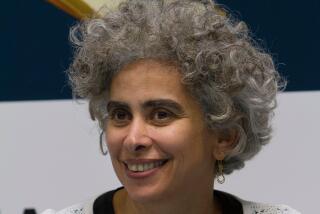Market Scene : German Bookworms Bow to New Media : CD-ROMs and other computer technology claim a major role at Frankfurt’s annual book fair.
- Share via
FRANKFURT, Germany — The first time Erik Schylander showed up at the Frankfurt Book Fair to peddle CD-ROM-equipped computers for the Dutch company Philips Electronics, in 1986, the world publishing Establishment treated him like, well, a hardware salesman at a book fair.
“They said to go away,” said Schylander, Philips’ general manager of strategy and standards. “And I said, ‘I’ll come back in 10 years to see if I can get a corner.’ ”
It didn’t take 10 years, and Philips grabbed more than a corner this year at the 46th annual Frankfurt fair, where electronic media claimed about 97,000 square feet in a hall of their own.
But while no one showed Schylander the door, the response from book lovers was still something less than a kiss.
“The people walking around and looking are friendly,” Schylander volunteered in explanation of his reception. “Um, the rest is a question of understanding. It’s a cultural problem among publishers, to understand and use the new media.”
Microsoft, one of the largest U.S. producers of CD-ROM titles, set up a mini-theater, a bank of computer terminals and a coffee bar to friendly up the crowd. The center of attention was CD-ROM--Compact Disc/Read Only Memory--the technology that puts information and games at your fingertip, or your mouse’s paw tip.
“You’re talking about people venturing out into a new frontier of publishing,” said Microsoft marketing manager Mitchell Wolfson. “A lot feel nervous, apprehensive. They feel they are being forced. And they are not sure what their next step is.”
The computer guys hastened to assure their colleagues in traditional publishing that CD-ROM, CD-I and the other elements of 21st-Century multimedia are complements to books, not competitors. They are television to radio, CNN to newspapers. Different markets, the computer experts asserted.
*
You could see pain on the faces of those who speak of a “special feeling” for books. Cozy up in bed with a CD-ROM? Thumb through a first edition of Grolier Multimedia Encyclopedia? Feel a freshly minted disk? These were people who still spell byte with an i .
“I love the old way of printing and making books,” said Claus-Peter von Nottbeck, a Cologne publisher who has put out 25 books on the natural and political sciences. “You are losing a lot of old traditions.”
German entrepreneurs generally are not known to leap to the forefront of new technologies. In electronic publishing, they’re about five years behind their American counterparts, said Torsten Brunn of Boersenverein des Deutschen Buchhandels, Germany’s central organization of booksellers.
But the publishers and booksellers roaming the aisles of the high-tech hall were also practical sorts. They use mobile telephones and pocket calculators, work on computers and recognize that people around the world are spending less time each day with books.
By the end of the year, Germans will own an estimated 1.5 million computers with CD-ROM capability--2.5 million by the end of 1995. Even Von Nottbeck sees himself going electronic in the next two years.
“I feel I have to,” he said.
The electronic media made their debut at the 1993 Frankfurt fair, and the number of firms exhibiting earlier this month had more than doubled since then, to about 230. Though still only a fraction of the fair’s 8,600 exhibitors, they made a splash in the German press.
“The new media is there. We cannot talk it away,” said fair director Peter Weidhaas. But the printed book, he insisted, “will not lose its importance.”
*
Though fair officials gave the electronic folks their own place this year, the plan, according to Microsoft’s Wolfson, is to integrate them back into the main halls.
“As we move into the mainstream in the next three or four years, we’ll be alongside the books,” he said.
In fact, they already acted pretty mainstream, serving wine and cheese over electronic dictionaries. The aisles of the electronic media hall were packed with booksellers and bookworms and salespeople hawking electronic encyclopedias, medical texts and on-screen maps.
“The main question asked by publishers is, does the CD-ROM replace books? We don’t think so. But the market share of CD-ROMs will grow,” said. Annette Damerow of Bertelsmann Electronic Publishing.
Gertraud Griepke, electronic media manager of the German science and medical book publisher Springer, said just 1.7% of her company’s production is electronic. She expects that to jump to 10% in the next five years.
Griepke said consumers don’t have to understand how their electronic media work, just how to operate them. “I don’t know what my phone is doing when it rings or what my car is doing when I switch on the engine. I just know it goes grr-r-r-r and I can drive it,” she said.
Griepke and other electronic publishers said traditional publishers are nervous about electronic media because of a shortage of good developers in Germany and because the software is easy to duplicate, robbing them of potential customers.
But she said authors and consumers want full multimedia capability, such as beating hearts in medical books.
“Our authors are forcing us to go into this,” she said.
More to Read
Inside the business of entertainment
The Wide Shot brings you news, analysis and insights on everything from streaming wars to production — and what it all means for the future.
You may occasionally receive promotional content from the Los Angeles Times.









